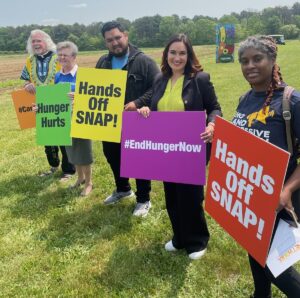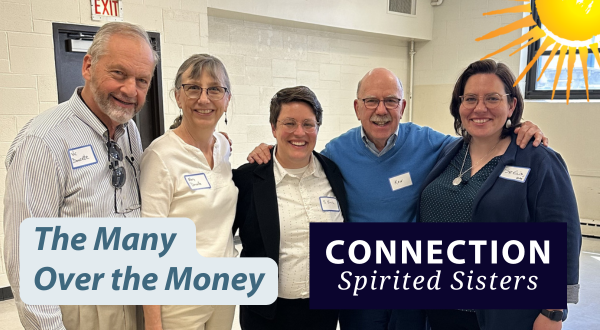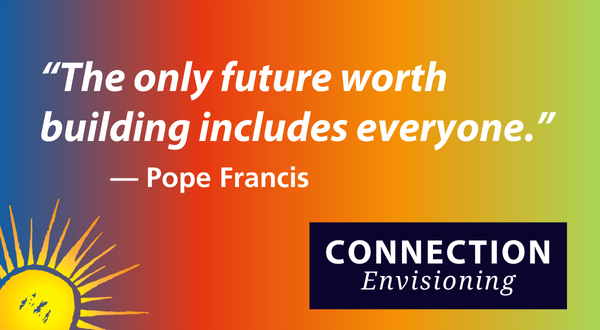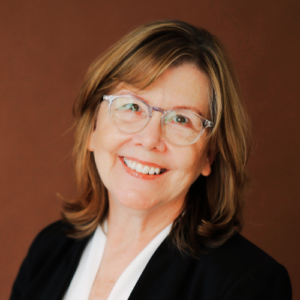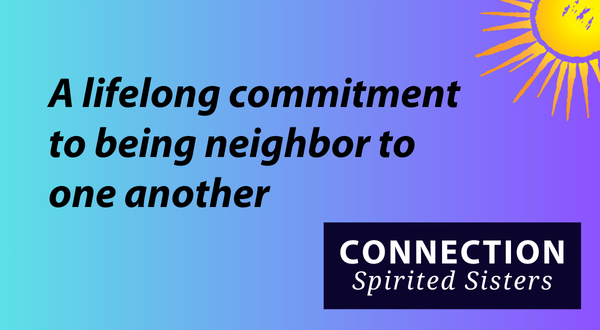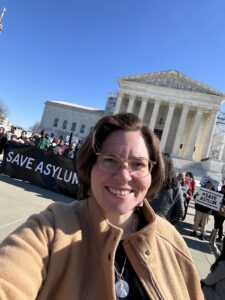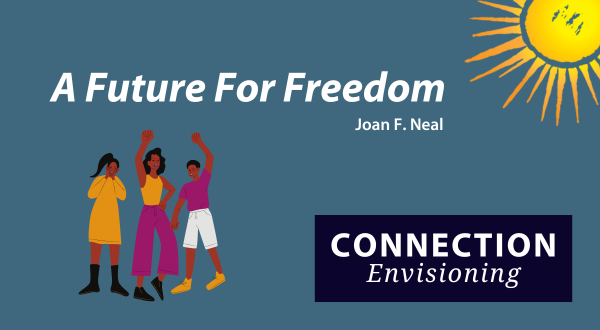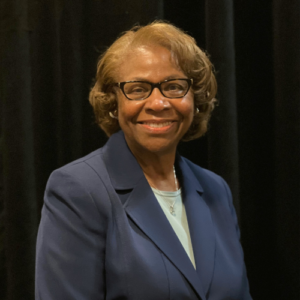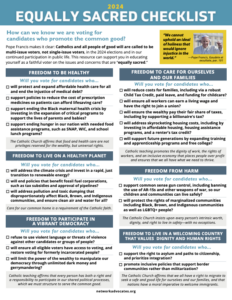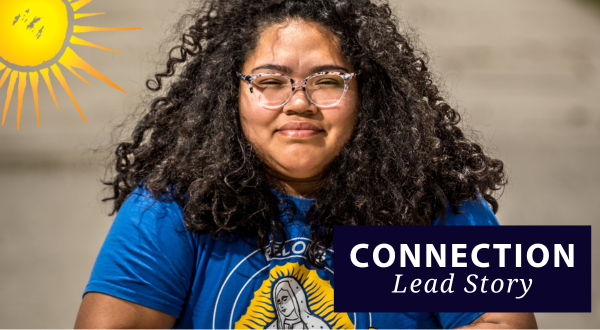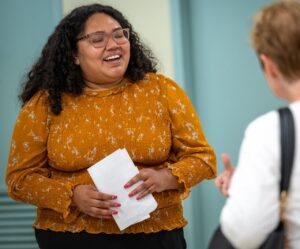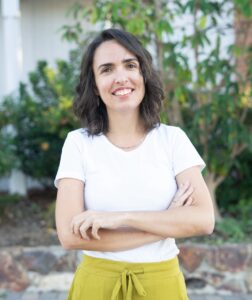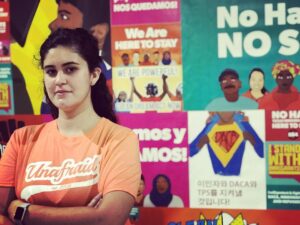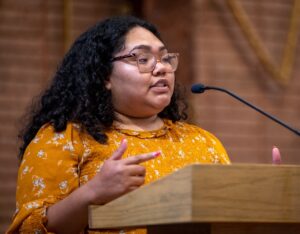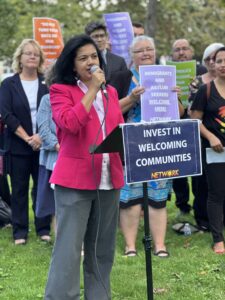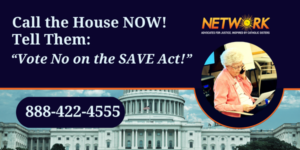
Welcome, Y.A.L.L.
Young Advocates Leadership Lab Promotes Political Engagement on College Campuses
Jane Sutter
September 5, 2024
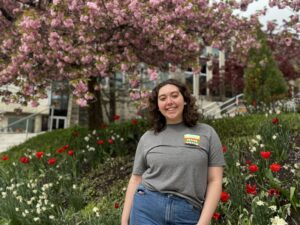
Baylee Fingerhut, a sophomore at St. Joseph’s University in Philadelphia, is one of ten students in NETWORK’s new Young Advocates Leadership Lab (Y.A.L.L.) Y.A.L.L. serves as a training space for faithful young adults to build the skills needed to be advocates for justice in the world today. Photo: Min. Christian Watkins.
When Baylee Fingerhut, a sophomore at St. Joseph’s University in Philadelphia, read about a new program seeking college students to become advocates for social justice, she was intrigued.
“I thought how amazing it would be to be a part of that, not just something that would help me grow my professional skills and help me network but to be part of something so impactful, like this inaugural group of youth leaders who want to go out and advocate and make a change,” she says.
Fingerhut is part of the first cohort of ten students in NETWORK’s Young Advocates Leadership Lab. Y.A.L.L. is a leadership and advocacy skills development program for college students, serving as a training space for faithful young adults to build the skills needed to be advocates for justice.
Building Up Y.A.L.L.
Over the years, NETWORK has offered training for college students, but Y.A.L.L. offers a new, deeper level of engagement with young justice seekers. It’s a natural outgrowth of NETWORK’s vision to mobilize a diverse national movement of justice-seekers.
For Fingerhut, a public policy major, the 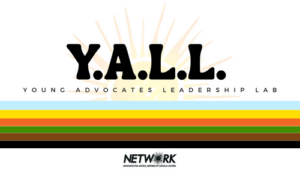 opportunity to participate in Y.A.L.L. has given her the opportunity to both advocate for others and “do the grassroots, boots-on-the-ground work” such as registering fellow students to vote and having conversations with students about why their vote matters, she says.
opportunity to participate in Y.A.L.L. has given her the opportunity to both advocate for others and “do the grassroots, boots-on-the-ground work” such as registering fellow students to vote and having conversations with students about why their vote matters, she says.
Choosing the ten students for the inaugural class of Y.A.L.L. was a competitive process as 60 students applied, according to Chelsea Puckett, NETWORK’s Grassroots Mobilization Outreach and Education Specialist, who acts as the convenor and staff liaison for the program.
Recruitment involved outreach to Catholic Sisters, advocates, and colleges where NETWORK had a relationship, as well as utilizing online tools for making professional connections with college students.
“We wanted to build a cohort of people to adhere to NETWORK’s mission of working for justice and equity for all people,” Puckett says.
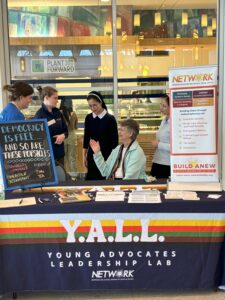
Diversity of all kinds was an important factor. Not all the students are Catholic, but as part of the interview process, students were asked how their values, faith, or morals drive their advocacy work.
“We wanted to be inclusive of all different belief systems and backgrounds,” Puckett says.
Y.A.L.L. runs in two 13-week phases. The first phase took place from March into May, followed by a summer hiatus. The second phase will run from August into November. Each student commits to five hours per week and receives a competitive stipend.
Engaging With College Students
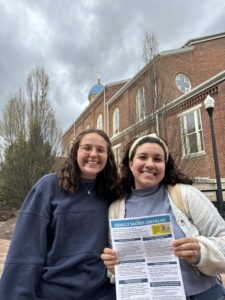
Katie Crump, left, and Anna Kopsick of the University of Dayton pose with the 2024 Equally Sacred Checklist, the central resource of NETWORK’s voter education campaign. Crump, class of 2025, is a member of NETWORK’s Y.A.L.L. cohort.
With Y.A.L.L.’s focus in 2024 being voter education and mobilization, in the spring, students hosted voter registration drives on their campuses, staffing tables in prominent campus locations, such as outside a student center or inside a cafeteria. They used the opportunity to introduce the 2024 Equally Sacred Checklist, NETWORK’s multi-issue voter education resource, to their peers.
At Pepperdine University in Malibu, Calif., Y.A.L.L. leader Kaila Crouch and Puckett helped students check online to see if they were registered to vote.
“It’s something you don’t really think about until, unfortunately, it might be too late,” Crouch says. She notes that students who registered to vote at the Y.A.L.L. table seemed relieved and made comments such as, “Wow. I’m happy this is checked off on my list of things to do.”
Crouch, who will return to campus in the fall to study for an MBA, and Puckett also visited a leadership and development class of senior students to discuss multi-issue voting.
Y.A.L.L. participant Imani McClammy, majoring in political science at Barry University in Miami, Fla., enjoyed teaching fellow students about multi-issue voting, quoting a line she learned from Puckett: “We’re multi-issue voters because we live multi-issue lives.” She told students how true that is. “I care about housing, I care about education, I care about minimum wage. These are all things that impact our lives.”
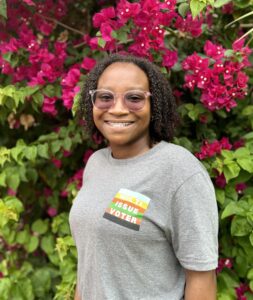
Imani McClammy, class of 2026, Barry University, Miami
Participating in the Y.A.L.L. program has been revelatory, several participants say. Theresa Lindberg, a freshman majoring in English literature and Spanish at Mt. Mary University in Milwaukee, Wis., says she discovered in talking with students that “some people just are not going to be interested in voting.”
McClammy says she believes the biggest challenge on her campus is explaining to students why voting matters. When she hears students say, “I don’t like politics,” she tries to explain: “Your life is full of political issues, even if you don’t think so.” McClammy researches laws or potential legislation to use as examples of what affects students’ lives, and she encourages them to find out what legislation the candidates support.
Puckett says the on-campus experience has been revealing. “Students are busy people,” she notes. “To hear what issues matter to them based on what they’re studying or their lived experiences was really insightful as we continue this work with young people.”
Breaking Through the Noise
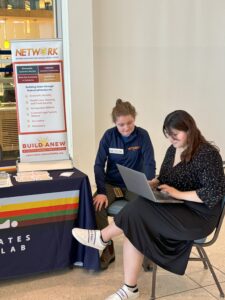
Chelsea Puckett of NETWORK assists a student during an on-campus voter registration event at the University of Mount Mary in Milwaukee. Y.A.L.L. events on campuses will focus on voter awareness and engagement.
A key part of the Y.A.L.L. initiative is the weekly virtual trainings offered to the participants and conducted mostly by NETWORK staff. For the spring effort, students participated in a variety of workshops, including how to conduct a voter registration drive, multi-issue voting, breaking through the election noise, deep canvassing and door knocking, and appropriate use of social media.
One key training was on how to have difficult conversations with fellow students who have different viewpoints. The Y.A.L.L. participants did roleplay to practice, Puckett says.
Lindberg says those exercises were valuable “because we live in such a polarized country.” McClammy agreed. “Doing that workshop helped me more in having those difficult conversations and always finding a way to tie it back to Y.A.L.L.’s mission—being multi-issue voters.”
Y.A.L.L. participants also spent time in the spring laying the groundwork for campus initiatives in the fall. This included forming partnerships with appropriate student groups, campus ministries, and political science professors. The core mission for the fall will be get-out-the-vote efforts, so students are planning voter registration drives at orientation events for freshmen and transfer students. They’ll also knock on doors in student housing and off-campus apartments.
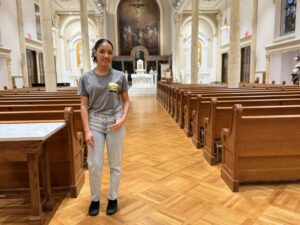
Ishara Baez, a student in the class of 2025 at the University of Mount St. Vincent in the Bronx, NY, is among the ten students participating in NETWORK’s Y.A.L.L. program.
Y.A.L.L. students will inquire if students have a plan to vote and if they have a way to get to the polls. For those hesitant to get involved in the democratic process, students will use their conversational skills to try to convince them to do so.
Puckett notes that NETWORK’s involvement on campuses has been met with a warm welcome. “We plan for these to be sustainable relationships over many, many years,” she says. A new cohort will be selected for 2025, Puckett says.
Fingerhut, at St. Joseph’s University, says she already had some background in Catholic social justice, having learned about it in classes, but she had never seen a tie-in with politics. Participating in Y.A.L.L. has been “transformative to see it come to life on a stage such as a federal election.”
Learn more about NETWORK’s Young Advocates Leadership Lab (Y.A.L.L.) here.
Jane Sutter is a freelance journalist based in Rochester, N.Y., and is part of the NETWORK Advocates team in New York State.
This story was published in the Quarter 3 2024 issue of Connection.







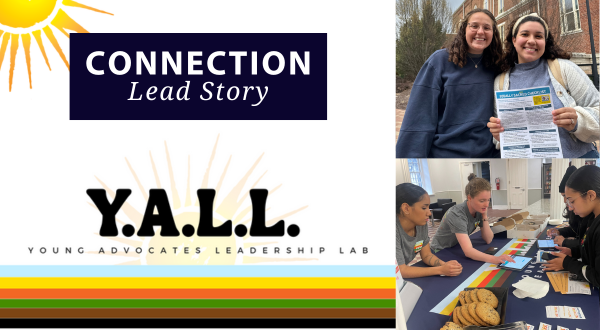
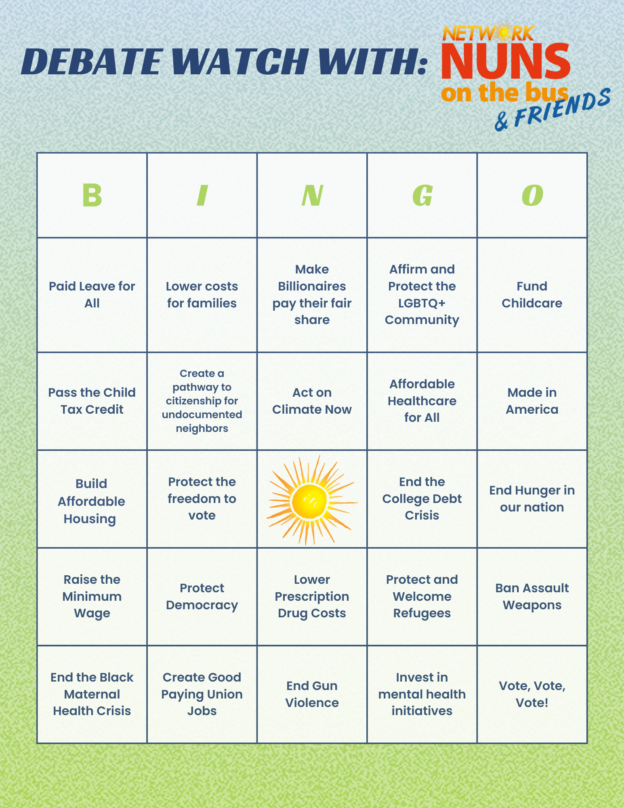
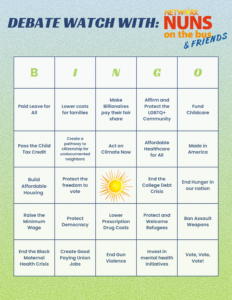

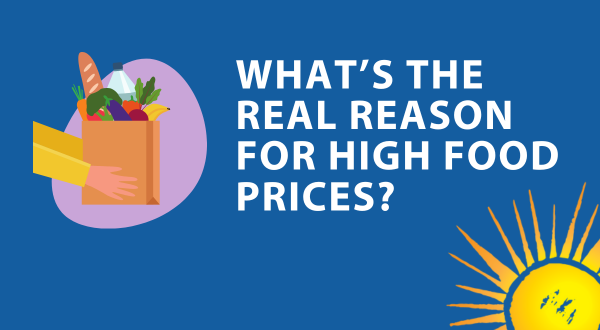
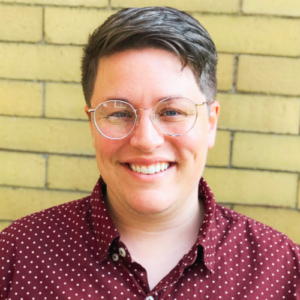
 Big corporations made $2.5 trillion in profits in 2021 alone, their most profitable year since 1950—and corporate food executives still raised prices.
Big corporations made $2.5 trillion in profits in 2021 alone, their most profitable year since 1950—and corporate food executives still raised prices.
